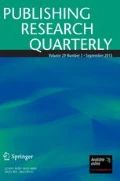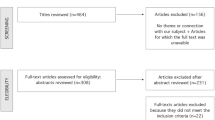Abstract
The world of book publishing is currently undergoing a major paradigm shift, but this was already fully under way in the 1990s. In the German novel Abstieg vom Zauberberg, published in 1997 by an anonymous author under the pseudonym Jens Walther, we are given an excellent insider view of the concrete situation within literary publishing houses and how they operate behind the scene and in public to secure the best possible titles and to fend off manuscripts that appear to be trivial literature. The author proves to be highly educated in the history of German and western literature at large and also demonstrates great expertise regarding book fairs, book reviews, and book prizes, framing all this by a somewhat twisted love story involving a young author, Anna Becker, and two men, first the young Johannes Rieger, then his father Helmut Rieger, both representing the fictional publishing house Engsfeld.
Similar content being viewed by others
Notes
See, most recently, the contributions to The Cambridge History of the Book in Britain. Vol. 7: The Twentieth Century and Beyond, ed. Andrew Nash, Claire Squires, and I. R. Willison (Cambridge: Cambridge University Press, 2019); Helmut Hilz, Buchgeschichte: eine Einführung. Bibliotheks-und Informationspraxis, 64 (Berlin and Boston: Walter de Gruyter, 2019). For an optimistic paean on the role of the book even today, see Andreas von Arnauld and Christian Klein, Weil Bücher unsere Welt verändern: vom Nibelungenlied bis Harry Potter (Darmstadt: wbg Theiss, 2019); Matthias Bickenbach, Buch oder Bildschirm?: Versuch über die Zukunft des Lesens (Stuttgart: Alfred Kröner Verlag, 2017); cf. also Lorenzo Soccavo and Paul Soriano, Gutenberg 2.0: le future du livre; six siècles après Gutenberg une nouvelle révolution va changer votre façon de lire. 2nd ed. (Paris: M21 Éd., 2008).
This is a huge issue extensively discussed by psychologists, learning specialists, philosophers, and others; see the contributions to Deep Comprehension: Multi-Disciplinary Approaches to Understanding, Enhancing, and Measuring Comprehension, ed. Keith Millis, Debra L. Long, and Joseph P. Magliano (London and New York: Routledge, 2019); Eric Purchase, The Future of Reading (London and New York: Routledge, 2019).
Paul Crosthwaite, The Market Logics of Contemporary Fiction. Cambridge Studies in Twenty-First-Century Literature and Culture(Cambridge: Cambridge University Press, 2019); there are specialized studies on the book markets in many countries of this world, see, for instance, Jorge J. Locane, De la literatura latinoamericana a la literatura (latinoamericana) mundial: condiciones materiales, procesos y actores (Berlin and Boston: Walter de Gruyter, 2019); Las ferias del libro como espacios de negociación cultural y económica, ed. Marco Thomas Bosshard and Fernando Garciá Naharro (Madrid: Iberoamericana; Frankfurt a. M.: Vervuert, 2019); Corinna Norrick-Rühl, Internationaler Buchmarkt. BRAMANN Basics—Buch and Medien. Bibliothek, 4 (Frankfurt a. M.: Bramann, 2019).
Thomas Eger and Marc Scheufen, The Economics of Open Access: On the Future of Academic Publishing. Diagramme: New Horizons in Law and Economics (Cheltenham, UK, and Northampton, MA: Edward Elgar Publishing, 2018).
Jens Walther, Abstieg vom Zauberberg (Frankfurt a. M.: Eichborn Verlag, 1997). All translations are my own.
For a vehemently negative review, see the critical comments in the famous magazine with news and cultural comments, Der Spiegel 44 (1997), Oct. 27, 1997, online at: https://www.spiegel.de/spiegel/print/d-8810552.html (last accessed Jan. 1, 2020). For a much more balanced and well-founded review, see anonymous, “Anna macht Karriere,” Focus Magazin 42 (1997), section ‘Literatur,’ online at: https://www.focus.de/kultur/buecher/literatur-anna-macht-karriere_aid_168201.html (last accessed on Jan. 2, 2020).
For book fairs in North America, see https://www.bookfairs.com/fairs.html (last accessed on Jan. 2, 2020).
This is, of course, a rather subjective term; see Canon and Canon Transgression in Medieval German Literature, ed. by A. Classen. Göppinger Arbeiten zur Germanistik, 573 (Göppingen: Kümmerle, 1993); Albrecht Classen, “Response to Forum on the Canon in German Studies,” German Quarterly 84.1 (Dec. 2011): 1–3; id., “The Torturous and Random Process of the Canonization in Literary History from the Middle Ages to the Present. The Case of Erasmus Widmann as an Example—The Victimization of a Poet Oddly Situated between Epochs, Cultures, and Religions,” Studia Neophilologica 83.1 (2011): 94–103; Reading the Canon: Literary History in the 21st Century, ed. Philipp Löffler. American Studies, 281 (Heidelberg: Universitätsverlag Winter, 2017).
For very brief exceptions, see Johannes Franzen, Indiskrete Fiktionen: Theorie und Praxis des Schlüsselromans 1960–2015 (Göttingen: Wallstein Verlag, 2018), 126; see also David-Christopher Assmann, Poetologien des Literaturbetriebs: Szenen bei Kirchhoff, Maier, Gstrein und Händler (Berlin and Boston: Walter de Gruyter, 2014), 331.
http://www.bookinist.de/bookinist/content/text/xolds/hase/@waabsti.htm (last accessed on Jan. 2, 2019): “Vieles im Buch ist schon bekannt oder wurde so vermutet, aber diese gekonnt geschriebene Abrechnung mit dem deutschen Kulturbetrieb liest sich so amüsant und süffig, man gönnt sich einfach ein Vergnügen, alles noch einmal in komprimierter Form schwarz-auf-weiß nachzulesen” (Much of the information contained in this book is already well-known or has been suspected so, but this skillfully conceived coverage of the German cultural market has been written in such an entertaining and addicting fashion that it is a pure joy to read everything once again in compressed form in black and white).
Uwe Wittstock, Marcel Reich-Ranicki: Geschichte eines Lebens (Munich: Blessing, 2005); Jasmin Ahmadi, Der Papst und der Bienenkorb: Marcel Reich-Ranicki als ein Akteur im literarischen Feld der Bundesrepublik (Frankfurt am Main: PL Acad. Research, 2015).
The scandal involved rape charges against the husband of one member of the jury, which then forced the Academy to postpone the awarding of the 2019 prize to 2020; https://www.washingtonpost.com/entertainment/books/the-swedish-academy-took-a-year-off-to-fix-the-nobel-prize-in-literature-its-still-broken/2019/10/10/23f1b6da-eb7d-11e9-9306-47cb0324fd44_story.html; https://www.reuters.com/article/us-nobel-prize-literature/two-members-leave-nobel-literature-committee-criticizing-swedish-academy-idUSKBN1Y61BC (both last accessed on Jan. 2, 2020).
https://www.kultur.klagenfurt.at/abteilung-kultur/preise-stipendien/ingeborg-bachmann-preis.html; https://de.wikipedia.org/wiki/Ingeborg-Bachmann-Preis (both last accessed on Jan. 1, 2020).
There is no literary prize under that name, but Oswald von Wolkenstein (1376/77-1445) was one of the best late medieval poets, originating from Southern Tyrol. The author freely and intelligently plays with many references to the entire history of German literature from the Middle Ages to the late twentieth century.
Anonymous, “Anna macht Karriere” (see footnote 6).
Author information
Authors and Affiliations
Corresponding author
Additional information
Publisher's Note
Springer Nature remains neutral with regard to jurisdictional claims in published maps and institutional affiliations.
Rights and permissions
About this article
Cite this article
Classen, A. Jens Walther’s Abstieg vom Zauberberg (1997): A Literary Reflection on the World of Publishing in the Postmodern World. Pub Res Q 36, 32–42 (2020). https://doi.org/10.1007/s12109-020-09711-7
Published:
Issue Date:
DOI: https://doi.org/10.1007/s12109-020-09711-7




